TRACING THE PATH PODCAST
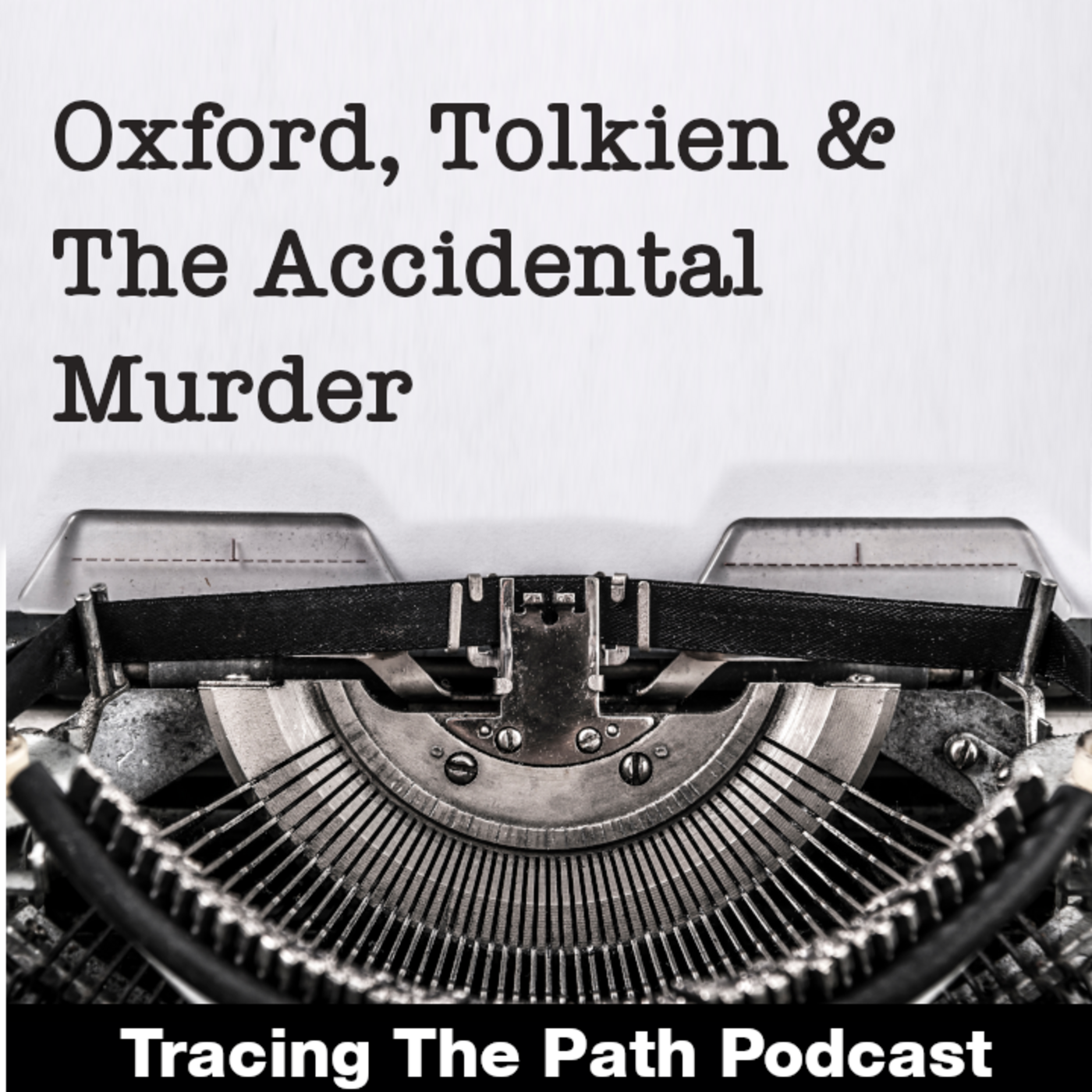
Oxford, Tolkein & The Accidental Murder
This text explores the intertwined histories of language, community, and the monumental creation of the Oxford English Dictionary. It highlights how figures like L.L. Zamenhof, creator of Esperanto, viewed language as a solution to societal division, and how J.R.R. Tolkien’s linguistic passions were ignited by constructed languages and his work on the dictionary.
The episode vividly details the OED’s ambitious origins, spearheaded by James Murray and significantly aided by the prolific, though institutionalized, volunteer William Chester Minor, demonstrating how a collective, crowdsourced effort was essential to documenting the vastness and evolution of the English language.
Ultimately, the source reveals that the dictionary was not merely a list of words, but a comprehensive historical record reflecting the dynamic nature of language and its profound connection to human culture and interaction.
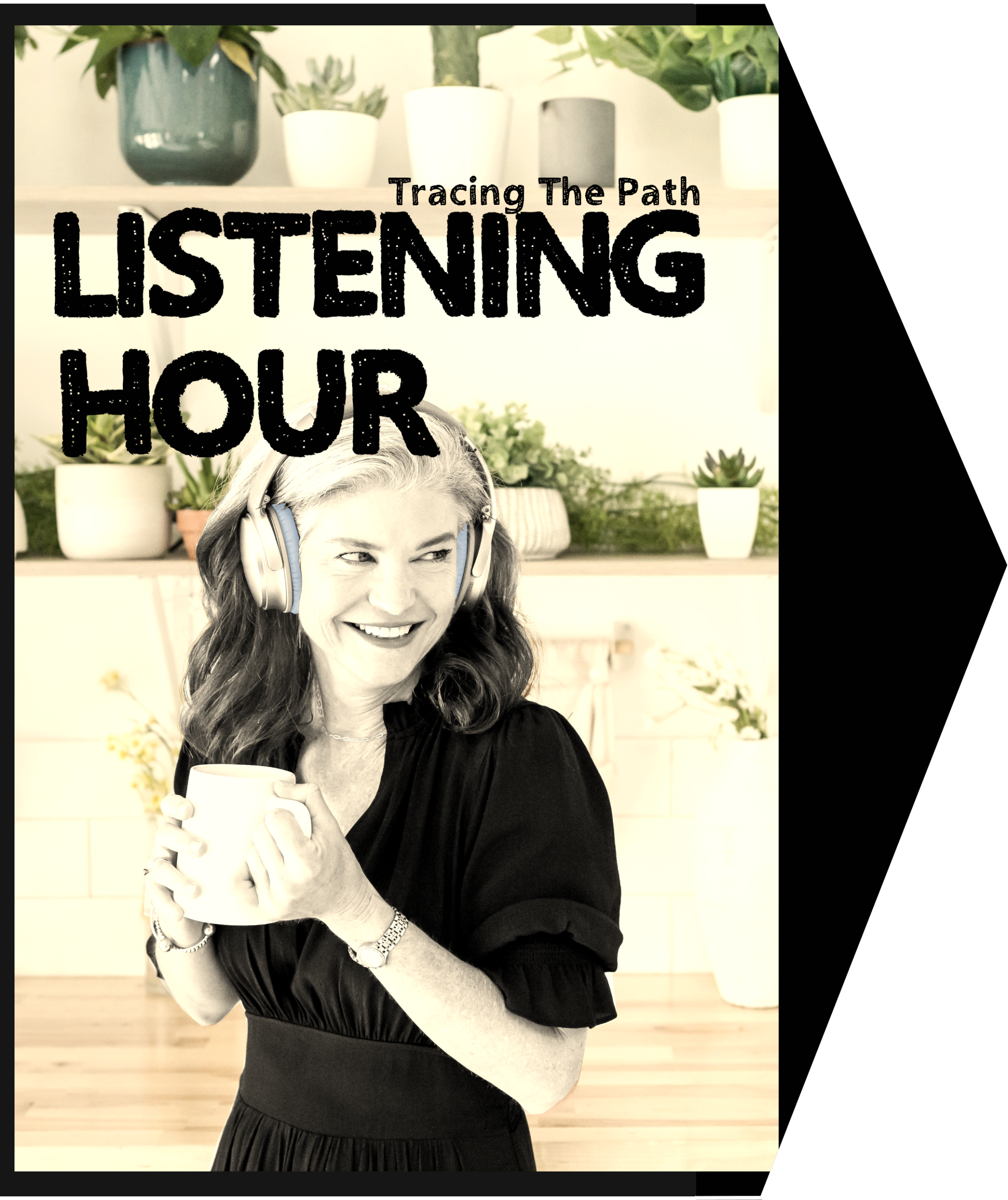
Audio Hour:
If you run an activity group, classroom or “audio book club”, click here for more information on using Tracing The Path.
Throughout the episodes, every tune is somehow related to the topic. In the Twinkies episode, for instance, the discussion of the Brooklyn Tip-Tops Baseball team concludes with “Take Me Out To the Ballgame”.
How many do you recognize? And harder, how many can you name?
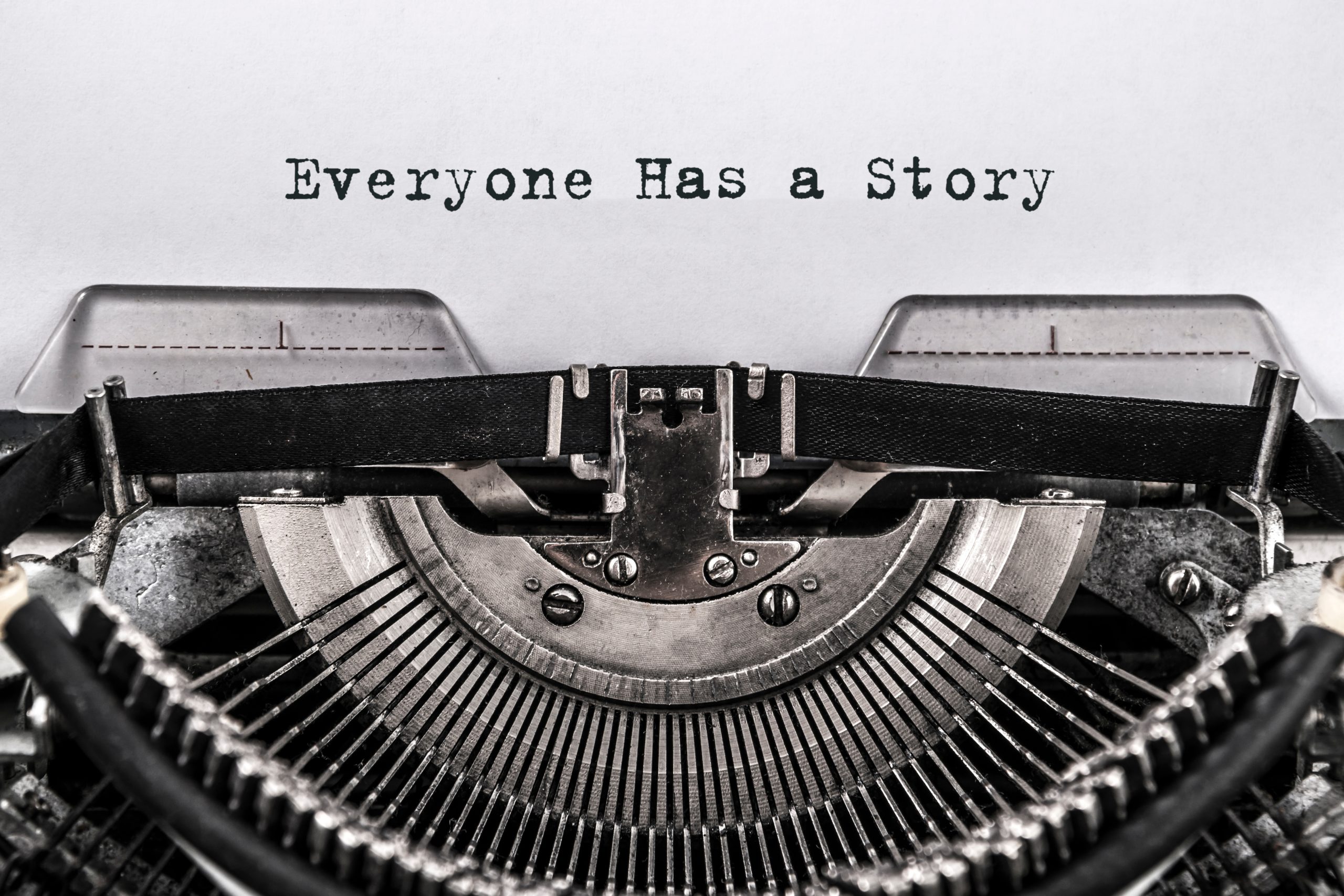
The Language of Languages
A language is not just words, it’s a culture, a tradition, a unification of a community. A whole history creates what a community is, it’s all embodied in a language. That’s what Nome Chomsky said, the father of modern linguistics. But even Nome had to stand on the shoulders of giants.
The 14th Amendment of the U.S. Constitution defined citizenship as someone born on American soil or on an American territory or to American parents. There is no language requirement to be part of the community, but language is important.
In 1839, William Chester Minor was born on the island of Ceylon to his American missionary parents. Minor’s ancestors had come to America ten years after the pilgrims arrived. The Minors were a well to do family, members of which are credited as founding the state of Connecticut.
Minors’ parents were Christians who felt a strong call to spread the word in far East countries. In 1883, they left for Ceylon and had a child William. His father was a printer, which gave Minor access to literature and newspapers.
His father encouraged him to read everything and to learn as many of the local tribe languages as possible. By the age of twelve, he had learned to speak Sinhalese, Tamil and Chinese in addition to English.
Being able to communicate made him feel very connected, but at age 14 he was sent back to America to live with his uncle Alfred. Back home, Minor excelled in school, eventually attending Yale and becoming a surgeon.
In 1863, after graduating, Minor felt compelled to join the army in the Civil War, fighting the social language of slavery. In America, the Civil War wouldn’t involve languages at all, often a problem found in other places.
5,600 miles away, LL Zamenhof was fighting something entirely different. Zamenhof was living in the strategically important city of Bialystok, Poland. Like W.C. Minor, he was also a surgeon who had grown up with a fascination for language. Bialystok was located in the northeast corner of Poland, near Russia and Lithuania.
Because of warring nations and moving borders, Bialystok was at different times within the borders of Russia, Prussia, Poland, and Lithuania. The result of that was its citizens spoke either Polish-German, Russian, Lithuanian, Yiddish or Hebrew.
Zamenhof was taught as a child to love his neighbor as himself. He grew up knowing Yiddish and Russian natively, but learned Hebrew, Polish and Belurusian to be able to speak to his neighborhood.
And then because his father was a French and German teacher, he also learned those. And finally in school, he was taught Latin, Greek and Aramaic. He was a literary scholar to say the least.
This gift, however, was also a punishment. Being able to understand those around him made him sad, saddened by the quarrels and frustrations between them. He had a hard time understanding why they disliked each other so much.
And so at school he developed a plan to rid the world of this evil.
He thought the best plan was to create a second language for everyone to learn. But in order for that to happen, it needed to be the easiest language to learn. Not complex at all, something you could learn quickly. His language would eliminate irregularities like silent letters, and inexplainable tenses.
And to make it even easier, there would be a small number of base words that could be elaborated on with a set of prefixes and suffixes. And he would let users determine the rest of the vocabulary, one of the first crowdsourcing experiments.
He introduced his language to the world in 1887 and it became instantly popular. Thousands of groups popped up around the globe, books were written, the League of Nations even considered adopting it.
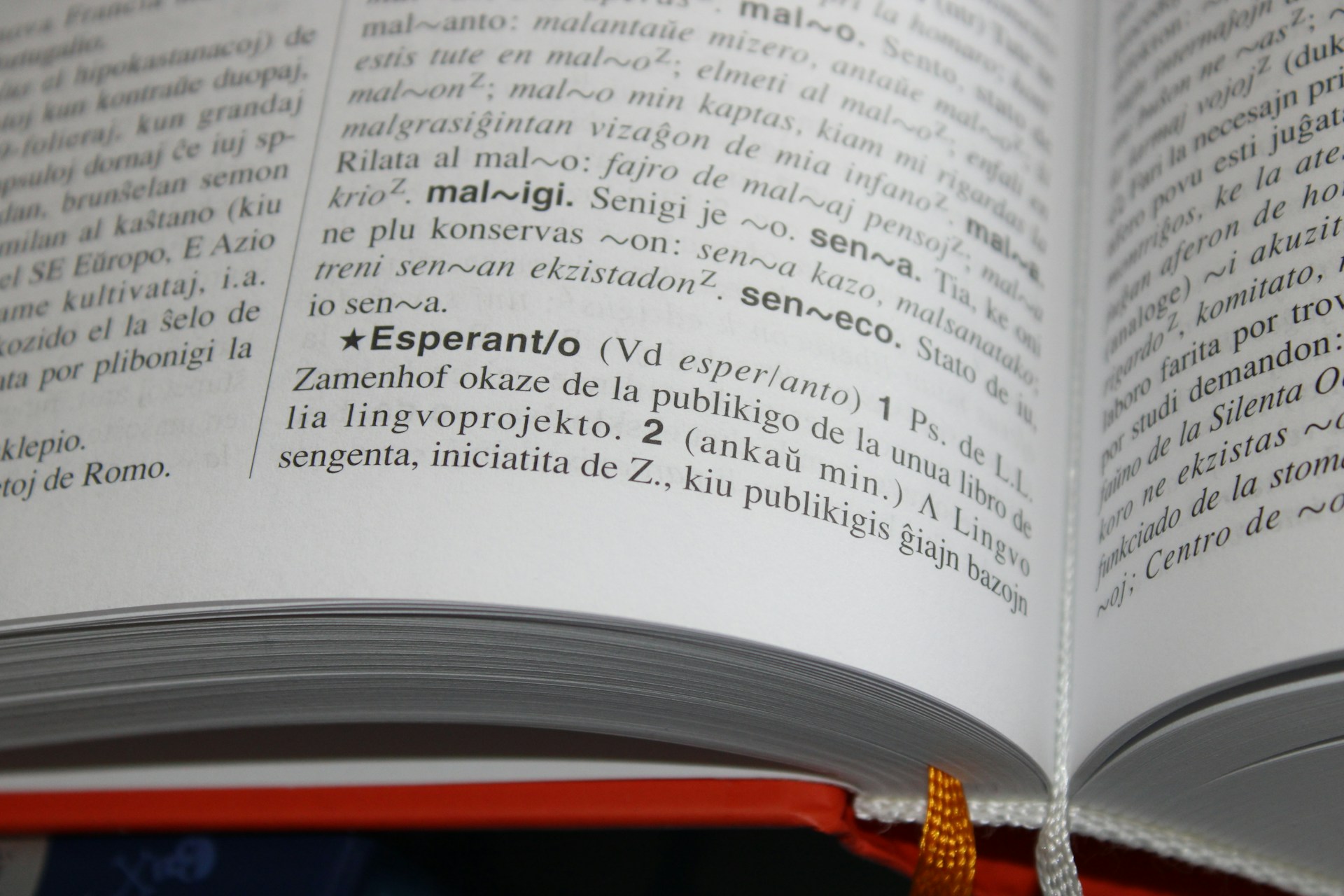
This New Language Was Called Esperanto.
Leo Tolstoy and J.R. Tolkien were early adopters of Esperanto. As a young man Tolkien’s cousins, Mary and Marjorie Incledon invented a private lanaguage caalled “Animalic”, which he had loved. A true fan of linguistics Tolkien learned Latin and Anglo-Saxon, and he invented his own languages, one called “Nev Bososh and another called Farry, which he then included in a book, called The Book of Fox-Rook.
In his copy of the book, the notes in the margin were written in Esperanto.
After high school, Tolkien’s love of language and literature took him to Exeter College in Oxford, England. And then afterwards he turned his attention to World War I, serving in the British Expeditionary Forces.
In 1920, after the war, he got a job back at Oxford, working for the New English Dictionary. He was responsible for the history and etymology of Germanic origin words starting with the letter W. Tolkien stated several times he had never learned as much in his life as he did working there.
Later in his life he would publish a Middle-Earth Vocabulary book which would not have been possible if it weren’t for the rigorous training at Oxford. The new English dictionary was not like anything that had ever come before it, and from the most part nothing has ever matched its sense.
And like Esperanto, its origins are tied to the geopolitics of the world stage.
It is amazing to consider, but when Shakespeare was writing plays, there was no such thing as a dictionary. You could not check the spelling, could not look to see if a word was used properly, or even if he had chosen the correct word. There did exist a collection of Latin words, and there did exist a Latin to English translation dictionary.
And in 1604, Robert Gaudry published an alphabetical table of hard, unusual English words.
But no book covered or even attempted to cover every English word. And for that reason, there had neither been rules for English nor the ability to teach it as a foreign language.
The heat around the lack of rules was being turned up by London’s elite as well. Jonathan Swift, who wrote Gulliver’s Travels, wrote the Earl of Oxford, demanding that a national standard language be defined, an expressed outrage that words like bamboozle, “upish” and “couldn’t,” were making it into print.
The scuttle and social circles was if physicists wanted definitions of blue and yellow and musicians wanted to standardize middle C, shouldn’t words and language follow, shouldn’t there be a book?
The Dictionary
Seeing the rising conversation and outrage, a group of five London booksellers got together and decided a thorough dictionary would probably sell really well. They contacted Bookstore owner, playwright, and lexicographer Samuel Johnson to see if he would entertain this idea.
And he did.
He created a dictionary that was the preeminent dictionary for 150 years. In fact, if you said the word dictionary, you probably meant Samuel Johnson’s. But Samuel Johnson’s dictionary wasn’t every word in English, and it had an editorial bent, including how words should be spelled instead of how they were commonly spelled.
So in 1857, the Dean of Westminster Abbey gave a speech at the philological society of London. Mr. Richard Trench. His life had largely been dedicated to the church, while his passion remained in words. It was his belief that through proliferation of English, the church could grow.
And in the same breath, the growth of English would grow the British Empire.
However, in reality, it was the British Empire conquering lands and setting up schools that was driving the growth of English. Like Zamenhof of Esperanto, Trench saw language as a political tool.
In his speech, he called for the creation of a masterpiece like no other, a dictionary that included every word in English and its origin and evolution. It would include every word that had been used for any duration since 1,200.
And in so giving the speech, the idea for the New English Dictionary was born.
It would take another 21 years, however, for that endeavor to get it away. Frederick James Funoval was the Secretary of the Philological Society who led the charge with the new dictionary. But it wasn’t until he got James Murray involved as the editor that actually made progress. That day was March 1st, 1879.
The moment he started, Murray wanted to get the Oxford Press involved for their connections and prestige, and he needed a staff. The goal, which seemed aggressive, was to produce a full four-volume dictionary in ten years. And Murray was the perfect man for the job, despite it not looking that way on paper.
James Murray
Murray had been born in 1837, the son of a tailor. His family was poor, so James Murray could only attend school through the age 14, the last year that school was free. That didn’t stop him from learning though. By the age 15, he was conversationally fluent in French, Italian, German, Greek, and Latin, and he taught himself geography, geology, and botany. By 20, his skills landed himself ahead master job at a local academy.
For most of his adult life, he was around Aficionados of literature. He would converse regularly with Alexander Melville Bell, Alexander Graham’s Bell’s father, at length about the origin of English words.
And his best friend was Henry Sweet, who, Bernard Shaw, would base the character Professor Henry Huggins in his book, Pigmalian.
He was through them that he was introduced to the Philological Society. While Murray hadn’t done anything of note, his book, the Dialect of Southern Counties of Scotland, would get him noticed in a big way.
The Secretary, Fernivol, invited Murray to a meeting at the offices of the Oxford Press on April 26, 1878 to tell him about a project they had for him. He was astounded to be in the room with greats like Alfred Lord Tennyson, William Morris, John Ruskin, and Harry Liddell, whose daughter had inspired Alice in Wonderland.
The project they would ask him to help with was to make a New English Dictionary, originally proposed by the Dean of Wentz, Mr. Abbey, back in 1857.
The scope requested for this dictionary was well beyond the limits of his imagination. This dictionary wasn’t going to be like Samuel Johnson’s, each entry being a word in definition.
This was going to be a history book of every single word in English. It would not only be a definition, but a real-life example of the word being used in printed form. He needed to read every book since 1,200 to find examples of every word.
The task was monumental.
He would settle on asking for hundreds of volunteers to help. Press releases were sent out, far and wide, inviting anyone who would be willing to read, make specific notes, and return them back to their offices. And not just the UK, but anyone from the English-speaking world. Once started, people from all over the world would mail in slips of paper about the size of a postcard, with notes about the word, and citation supporting the definition.
For instance, Janet Humphries, a children’s book author and one of the most prolific contributors, sent one in for the word “patic.” The sentence she found in a book read, “When you go into the “pit”, you can expect to see the “falls,” noting that she liked the sentence because it painted a picture of the word.

The Asylum
The press releases and invitations to volunteers are how William Chester Minor learned about the dictionary. William’s love of language came from the time when he lived in Ceylon with his missionary parents, where he learned all the local tribe languages and read his dad’s newspapers.
And despite returning to America to attend Yale, he didn’t go for language but instead for medicine. And again, after graduating from Yale, he found himself in the Union Army as a medic, fighting slavery.
His first stint was in quiet New Haven, Connecticut, where the army put him to get some experience first. Battles like Gettysburg, where his services were needed, he could only read about.
Then he was transferred to Virginia, where he got his first gut wrenching and harrowing look at the violence of war. There he served as medic at the Battle of the Wilderness, where 27,000 people died in 50 hours of battle.
It was here that the sadness of war began weighing on him.
After that he was sent to Governor’s Island to deal with a color outbreak, and at Governor’s Island a friend of his was mugged and beaten. It was the combination of sadness and stress and fear and death that took a toll on Minor.
He started to experience paranoia, couldn’t sleep, and would experience delusions. And the army knew he needed out.
They allowed him to check himself in at government hospital in D.C. And after 18 months, the army officially retired him. Minor still needed to get away though, and thought time in Europe painting, reading, resting, and spas would do him good.
And so he went with an easel, paints, his books, and still being a bit paranoid. His gun.
He arrived first in England seeking peace and quiet to take hold in his mind. He settled into the little town of Lambeth, but he wasn’t the least bit settled. His paranoia led him to believe he was being visited at night and beaten in his sleep.
On one such occasion, he woke up sweating profusely, thinking he’d seen a visitor fleeing his room. He left out of bed, grabbed his gun, and ran outside. That is where he saw a man walking down the street and shot him.
An innocent man walking home from work lay dead in the street.
Minor was captured, charged, and found guilty on the grounds of insanity. He was sent to the Broadmoor Asylum for the criminally insane as in May 1742. He was there eight years before finding out about the dictionary volunteer job.
In that time, he had used his military pension to pay for extras and books. He was very remorseful and wrote the dead man’s widow, so she came and he was able to apologize. She even came back twice more with books for Minor.
It is through her many believe that he found out about the dictionary job. For him it was something to keep busy.
But when he received the welcome packet from the dictionary staff, it was so much more than something to do.
- It was a badge of honor, welcoming him back to the world again.
- It was a last chance to be seen, to be relevant, and for his life to mean something.
For Murray, in running the dictionary project and managing the volunteers, W.C. Minor really stood out. Minor sent in a hundred words each month, but not just any words. Minor sent in the words they were working on at that moment. And his notes were so thorough and meticulous, only a handful of volunteers made the job easier, like he did.
Eight years after the project had begun, they had made it from the beginning of the alphabet to the word ant. Murray knew then the 10-year-old goal was but a dream. By 1888 four volumes been published all the way to the letter C.
Like clockwork Minor worked as he was part owner of the dictionary.
As time dragged on newspapers would suggest the book would never get done, But in 1896, a small miracle happened. Queen Victoria, put her stamp of approval on the project, to which the team decided to dedicate the letter C to her.
When it was finally regularly approved, there was no doubt it would be finished.
Murray thought it was a good reason to celebrate. They would have a big celebration dinner at King’s College, and Murray would finally get to meet his biggest contributors, like W.C. Minor. But like every invitation they had ever sent to Minor previously, he again did not show up.
Murray was baffled, as his address was only 60 miles away. And so Murray set out to meet Mino on his own, and was then that he learned the truth.
An American Civil War hero, in an asane asylum near London was his biggest contributor.
And so their friendship flourished over the years, but as Minor health deteriorated, Murray lobbied the government that he be set free to spend the rest of his life in America with his family.
After 38 years, in 1910, home secretary Winston Churchill signed the release orders.
Minor left and checked in at St. Elizabeth Hospital in Washington, D.C. and passed away in 1920.
Murray would also not see the end of the dictionary. The work to which he devoted his entire life represented an achievement unprecedented in the history of publishing anywhere in the world. He would pass away in 1915 while working through the letter T.
All in all it took 70 years to finish the New English Dictionary. When it was finished it had thousands f words, 1.8 million illustrative quotes and 227 million characters. And at the Gala celebrating the book’s end in 1927 was staff member J.R.R. Tolkien, who’d helped with the letter W.
Since languages are always evolving, as soon as the original ten volumes were completed, the editors began working on a supplement, updating words that had changed meaning over 50 years.
The original was then reprinted in 12 volumes, not 10, under a new name. A name you probably know well.
It took more than 70 years to build the Oxford English Dictionary.
CUTTING ROOM FLOOR
To hear all the stories that hit the cutting room floor, you have to listen to the episode.
ABOUT THE SHOW
Let us tell you the story of the 20th Century, by tracing each event back to the original decisions that shaped it. You’ll quickly find out that everybody and everything is connected. If you thought you understood the 20th Century, you’re in for a treat.
Tracing the Path is inspired by storytellers like Paul Harvey, Charles Kuralt, and Andy Rooney.
INTERCONNECTED EPISODES
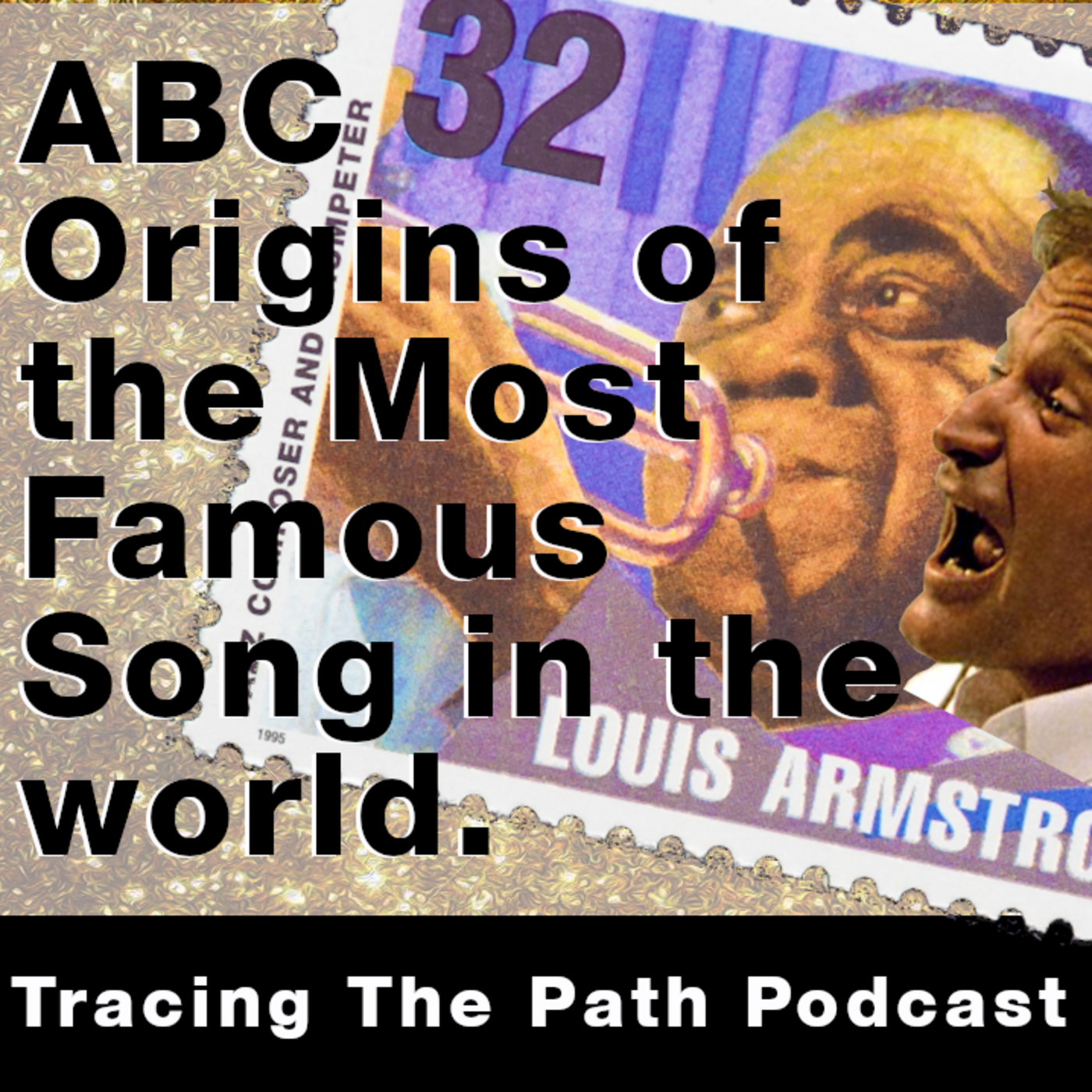 |
ABC Origins of the Most Famous Song in the World Can you believe a children’s folk song became a Grammy Winning Song |
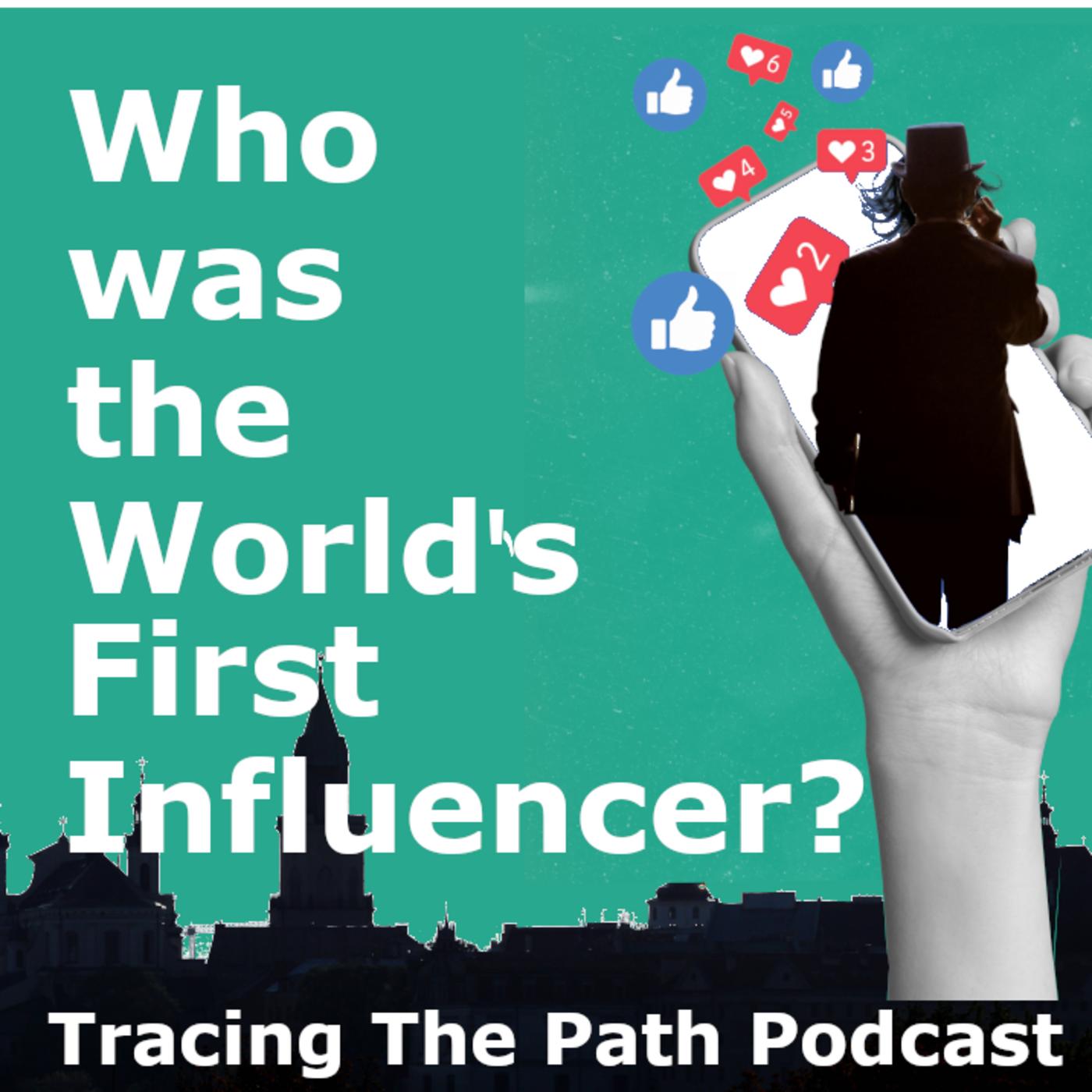 |
Was Charles Dickens the First Influencer? You might know his books, but did you know he did a world tour and had throngs of followers? |
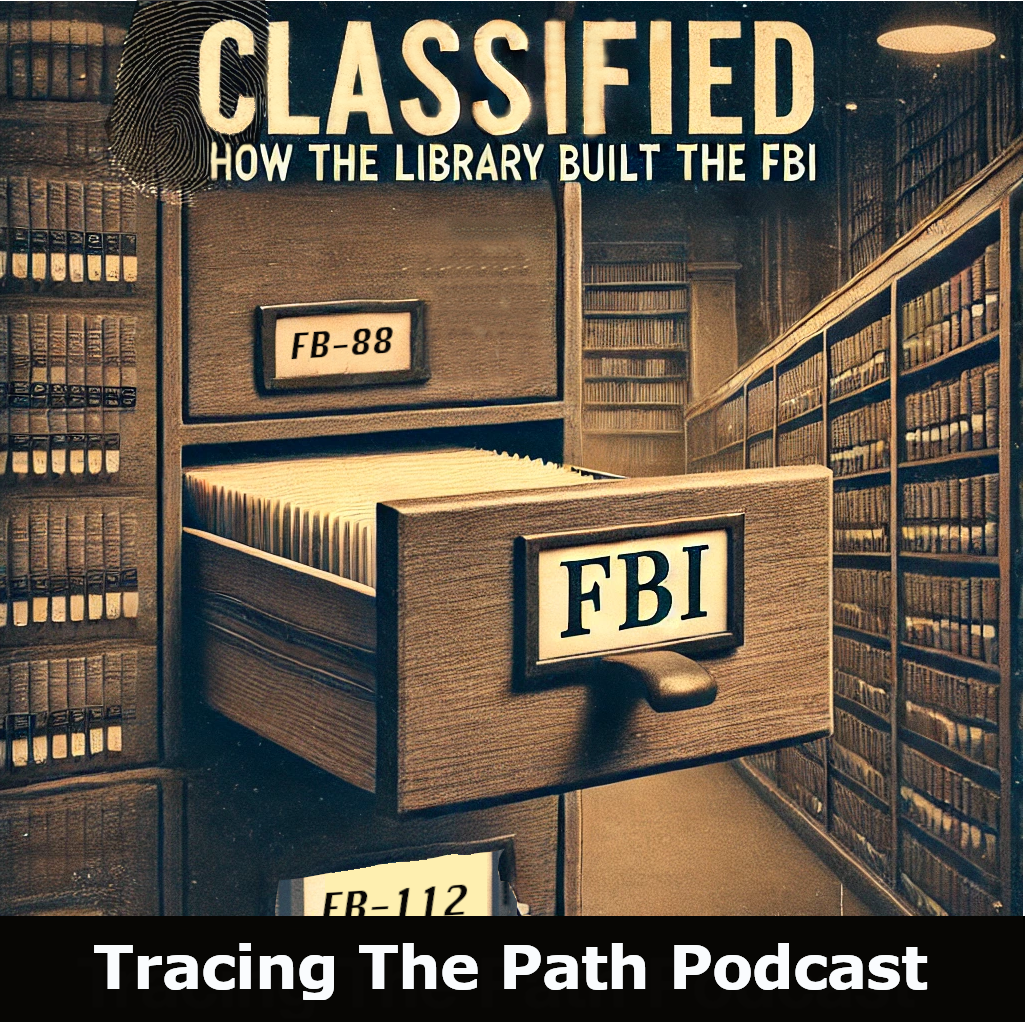 |
How the Library Built the FBI Could it be that all the secret agents and clandestine situations all come down to librarians? |
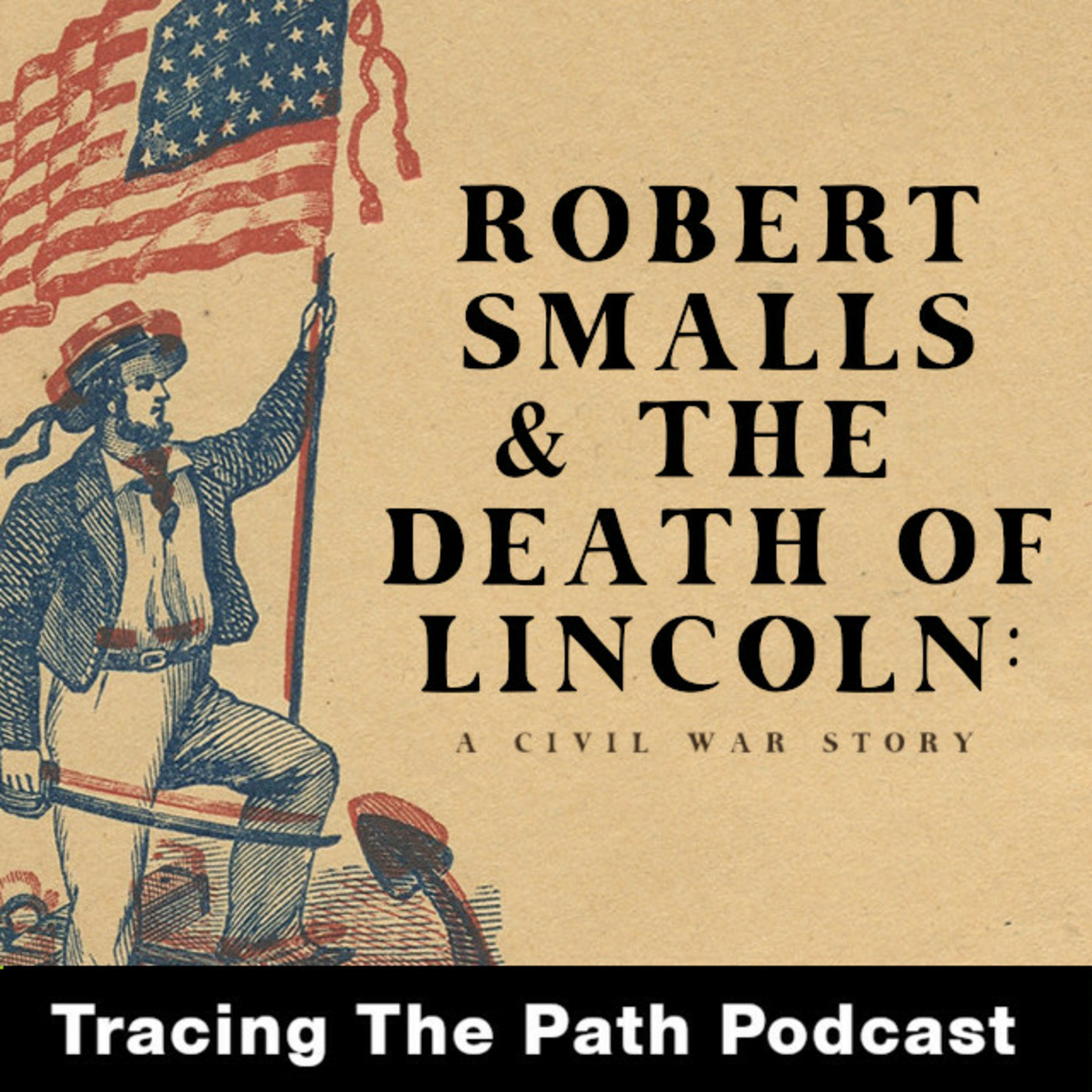 |
Robert Smalls and the Death of Lincoln If Lincoln was with Robert Smalls, he wouldn’t have been assassinated. |
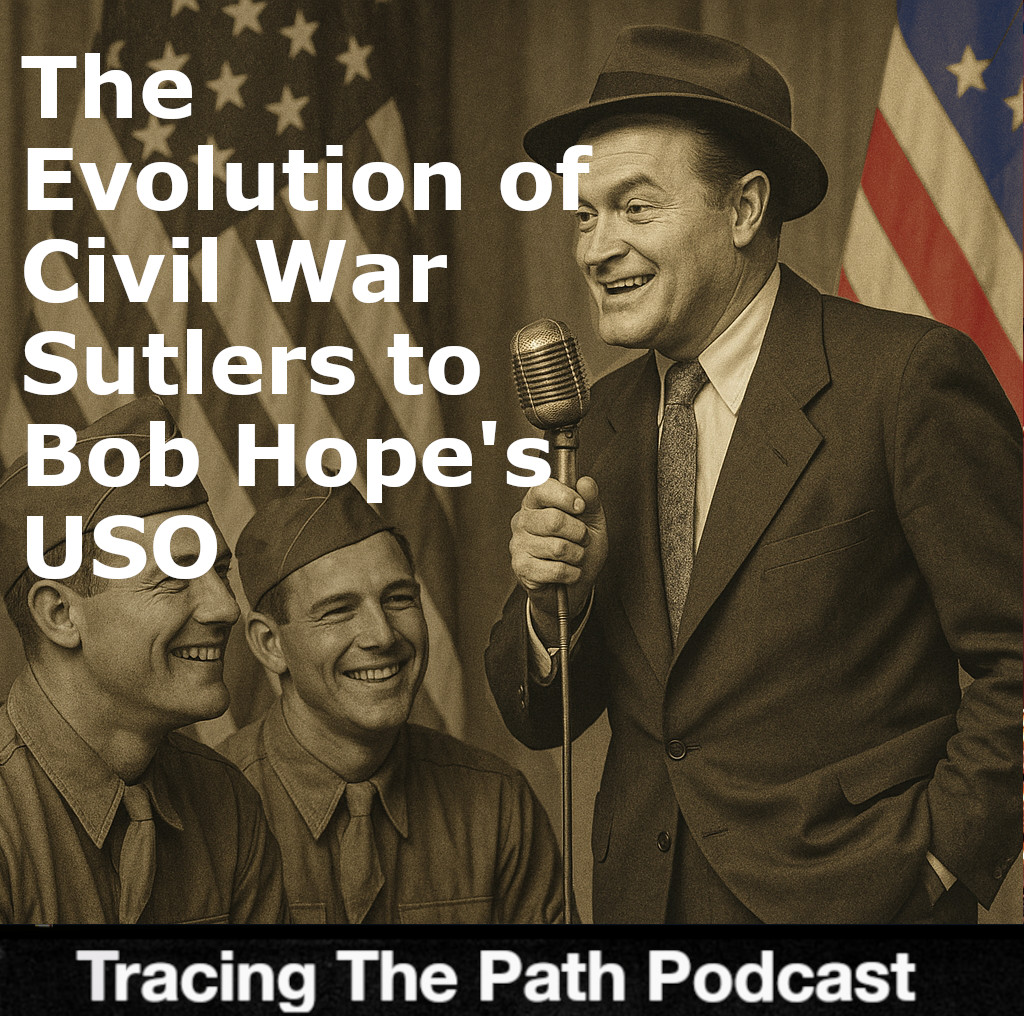 |
Evolving Civil War Sutlers into the Bob Hope’s USO Many factors went into the success of the USO. It wasn’t necessarily just big hearted celebrities |
SEE THE BIBLIOGRAPHY
SUBSCRIBE AND LISTEN (FOR FREE!)
RATINGS & REVIEWS
If you enjoy this podcast, please give it a rating and review.Positive ratings and reviews help bring Tracing The Path to the attention of other history lovers who may not be aware of our show.



